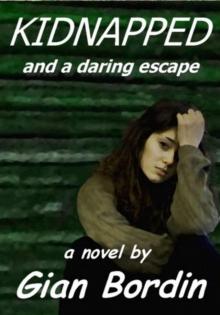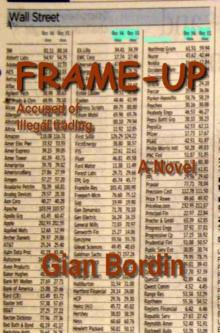- Home
- Gian Bordin
Kidnapped and a Daring Escape
Kidnapped and a Daring Escape Read online
Gian Bordin
KIDNAPPED
and daring rescue
Copyright © 2012 Gian Bordin
All rights reserved.
1
André Villier pushes through the bead curtain into the Alcazar Bar. He muses that this is a rather incongruous name for the shady pub in the rundown northern suburb of Colombia’s Ciudad Blanca — the white city, a name it got for its colonial center of whitewashed buildings. Its citizens praise that its splendor is second only to Cartagena.
Four bare 40-watt bulbs hang over the bar on short wires. Their light does not reach the far corners of the pub. Like the arms of a giant, a tired ceiling fan swirls the smoke in sinuous patterns. Occasional boisterous shouts and laughter punctuate the indistinct rumble of voices. Throngs of males jostle for space in front of the bar.
Pausing just inside the entrance, André scans the scene, trying to penetrate the smoky gloom to the far end of the room. He spies several alcoves. That’s where his intermediary in Medellin directed him to go. Slowly, he pushes through the crowd, steering to an empty one.
He has dressed down, wearing faded jeans and a crumpled-up open-neck shirt. However, he has no illusions that he won’t immediately be tagged as a gringo, his blond hair, blue eyes and white skin, hardly touched yet by the equatorial sun, a clear giveaway. In fact, a number of eyes briefly stray on him, several following his slow progress toward the back. How will I ever find my contact? he wonders Or, rather, how will he find me?
Although André ticked ‘tourist’ on the immigration entry card when he entered Colombia in January 2008, in truth he is in the country on an assignment as an investigative journalist. His real purpose is to get an interview with one of the top people in FARC. It is by far his most dangerous assignment ever. FARC stands for Fuerzas Armadas Revolucionarios de Colombia, the left-wing guerilla group who for half a century has been fighting successive Colombian governments, as well as the autodefensas, the local self-defense vigilantes, and the paras, the right-wing paramilitary groups. The latter were set up and financed by the drug cartels of Medellin and Cali and tacitly supported by Colombia’s armed forces. Their proclaimed purpose of clearing areas of communists was largely a front for their drug trade and for bringing the population in line to protect the interests of large-scale landowners and drug barons. Kidnapping and assassination became the preferred tools for both sides. In the last two decades of the 20th century they ran into the thousands each year. Nobody was safe. The paras targeted left-wing leaders and local and regional officials who were suspected sympathizers of the left, as well as journalists, TV personalities, civil rights activists, and high-ranking government employees, while FARC went mainly after wealthy business people, both local and foreign, and politicians — the 2002 kidnapping of Ingrid Betancourt, a presidential candidate, is the most notorious case.
In recent years, with the partial disbanding of paramilitary groups and a greater control of the army over a larger portion of Colombia, things have quieted down in many areas. However, FARC has retained control over the vast Amazon jungle region in the southeast of the country. André read recent reports that the various factions of FARC are still holding some 700 people. They also seem to have abandoned their original socialist aims and reverted more and more into a terrorist organization, largely financed through their own drug trade.
Ransoms demands regularly run into several million US dollars. The only foreigners exempt from kidnapping for ransom, but not political kidnapping, are US citizens, since the US Government immediately freezes the assets of any kidnapped Americans, thereby blocking any ransom payout. Since the 1980s Colombia has been and still is without doubt one of the most dangerous countries in the western hemisphere.
André realizes that he has to tread cautiously. Being Swiss clearly tags him as rich, and being a journalist in addition, he can easily end up as a target for both FARC and criminal gangs of ex-paras.
So here he is, in the Alcazar Bar, with the help of political contacts in Spain and France and the vague promises of an intermediary in Medellin who agreed to facilitate a preliminary meeting with a FARC representative in Popayàn. Presumably, the latter will arrange for André to meet up with a top-ranking FARC leader in the southern provinces of Caqueta or Putumayo.
He squeezes himself into the grimy bench of the empty alcove, making sure to keep an unobstructed view of the entrance. Beckoning a passing waiter, he orders a beer. He would prefer wine, but does not wish to risk getting another liquid more vinegar than wine as in Medellin when he met up with the intermediary.
With one eye always on the entrance, he watches the heated exchanges of drinkers near the bar, their gestures and facial expressions underscoring their words. The threesome standing at the near end of the bar talk soccer. He can only make out the occasional word. Two olive-skinned men, probably in their early twenties, sit on high bar stools next to them. They exchange an occasional knowing grin, but no words. André becomes aware that their glances often come to rest on him. Could they be his contacts? He observes them more closely. No, he decides. They look too soft, sporting rings on each hand. One wears his short hair spiked. The mistake makes him smile. Another mistake. One of the guys nods to the other and ambles over to his table.
"Ah, I am friend of Americans," he says in a heavily accented English as he sits down uninvited. "I can lead you place; lots of fun, you know?" His hands shape ample curves. "You like big tits? Great ass? Very fresh, very young. Only sixteen, I swear. Near here."
André replies in Spanish: "Sorry, señor, I am waiting for friends."
The guy also switches to Spanish. "You look new in town. Come, I’ll show you quickly. She lives just across the street. You’ll not regret it." He is gesticulating.
André notices that his right hand strays several times over his glass of beer. Is it accidental or intentional? he wonders. Has the guy dropped something into his drink? Before undertaking the trip, he informed himself of all the possible security risks, particularly the treacherous, tasteless drug Burundanga favored by thieves. A small dose of the powder in his drink and it would reduce him into a willing slave who hands over his wallet and discloses his credit card pin number without resistance. A large dose would render him unconscious almost instantly. It can even kill. He was warned to watch his drinks and food, never leave them unattended, and never accept a drink, or even chewing gum, sweets, or cigarettes from a stranger, particularly one who is friendly or offers help. Maybe that is a bit paranoid, he figures, but it is better to be safe than sorry.
André shakes his head. "Sorry again, but my friends will be here any minute."
"Come, amigo, Friday night traffic is terrible. They are bound to be late by half-an hour. More than enough time to have quick fun. You won’t get young flesh like this anywhere else for such little money. I take dollars. Come, drink up. It’s just next door."
So my suspicion is correct, André reckons. He wants me to down the drink. "Señor, I said no and I mean it. Please, leave me alone."
"You’re making a big mistake. You’ll regret it." He shrugs his shoulder, and then tilts the head a bit, producing a false smile. "But maybe you come back tomorrow night, when you have more time, right? And I’ll show you." He returns to his companion, briefly obscuring André’s view toward the entrance.
A newcomer stands inside the curtain, his face partially shaded under a black felt hat. In his left he holds a maroon lady’s handbag. His build is squat but not fat, exuding strength. His torso hardly fits into the brown shirt he is wearing and his solid thighs stretch the material of his jeans to the limit. He wears scuffed working boots. André immediately nicknames him ‘le trapu’ — French for ‘the squat one’. Tagging peo
ple with a telling label is a habit he picked up from his father already as a child. His father always gave fitting nicknames to every person he met. André guesses the man to be in his late thirties. His eyes roam over the patrons like somebody experienced in spotting danger and then come to rest on André.
My contact, flashes through his mind. He experiences a stomach flutter. Careful now, he reminds himself, play it right. Success or failure will depend on it.
After a moment’s hesitation, the man weaves through the crowd around the bar, aiming for the alcoves at the back. As he approaches, André rises and offers him a forced smile. For a split second, the man responds, puzzled, but then looks away and enters the adjacent alcove.
Bewildered, André is on the verge of calling out to him. He only desists when he hears the familiar greeting of two people who know each other. ‘Le trapu’ isn’t my contact, he concludes disappointed, and sinks back onto the bench. His hand reaches for the beer, but before the glass touches his lips he puts it down. Don’t become careless now, he reprimands himself. He turns back to watching the entrance.
On a subliminal level, the Spanish words for ‘bank transfer’, ‘200,000 euros’, drift into his mind. He instantly pricks his ears, closes his eyes and concentrates on the voices barely audible over the head-high opening to the adjacent alcove, but fails to catch every word.
"… advice from my bank this morning … been credited with your … in Antigua."
Does he detect a slight accent? The Spanish is fluent, but definitely not local or even Colombian, more like old country. Without being fully aware of it, he has already named the owner of that voice ‘le richard’ — ‘the moneyed one’.
"Señor, I will have that confirmed." That’s a local accent, no doubt ‘le trapu’, the fellow who has just entered the alcove.
"The balance of … thousand will be transferred … once the ransom … my account." It is again ‘le richard’.
Are they talking about a kidnapping, André questions silently? A frisson creeps up his spine. His eyes shoot open, his attention suddenly honed to breaking point.
"I’m sure I don’t have to spell out what will happen to you if you fail to honor your part, señor. Our reach is long."
"Rest assured, I will complete my part of the deal. But I must emphasize again, … keep her alive until the ransom … paid … need proof …"
Has he heard correctly? The intended victim is a woman? Why the reference to keeping her alive? In his agitation he almost misses the reply.
"We have satellite cell phones with image capability. But after that?"
"Use her or make her disappear, as I said earlier. How, I leave that up to you." It is followed by a short laugh. It sounds crass, ominous. For a second, he loses concentration and only catches the last word of what ‘le richard’ says: "… itinerary."
"Yes, we will intercept the Jeep before San José …"
Again he fails to understand the last bit. All he can guess is that the name of the location consists of several syllables. But there are dozens of San José ‘of something’ in every province.
A dispute erupts at the bar, drowning out the voices for a few seconds. Then he hears ‘le richard’ again.
"Is it a genuine Gucci …?"
A short laugh. "Is it genuine if it is made in the same factory, but sold on the black market?"
"I would say genuine. Here is the agreed …"
"I will check the money later."
What are they now talking about? André wonders. Are they also doing a drug deal?
The young guy, he automatically named ‘the pimp’ — no short French label readily suggested itself — and who pestered him before, now approaches once more, breaking his concentration. André only catches the word ‘bricks’. He can’t even tell whose voice it is.
"See, amigo," the pimp says, "your friends are late. We’ll have time for our little escapade. Look, I have a photo." The last is added in a hushed voice. He pulls out a tattered picture. "Look at those great tits, hombre. Wouldn’t you just love to suck them?"
André catches the fleeting back of somebody leaving the adjacent alcove. Although the man seems to be carrying the same lady’s handbag, he is certain that it is not ‘le trapu’, judging from his height and slim built. Trying to get a clearer glimpse, he finds his view blocked by ‘the pimp’. He half rises, for an instant tempted to follow the man he guesses is ‘le richard’, but then he thinks better of it. It could be dangerous.
When ‘the pimp’ sees him rise, he breaks into a pleased smile. "Good, you have decided to come after all."
André sits again and shakes his head, his mind still on what he just heard.
"Why not?" The guy raises his voice, clearly annoyed. "Hombre, she’ll do anything you want." He offers André a cigarette from a new packet of Marlborough. "Here, have a real American smoke."
Have they been doctored too? André wonders and declines. "Thanks, I don’t smoke."
"A stick of chewing gum instead? Real imported American stuff."
Has ‘the pimp’ within the space of a few minutes tried to make him take a dose of Burundanga by three different methods? Again, he declines. "Look, leave me alone. I am not interested in a girl, nor cigarettes or chewing gum. All right?" He keeps his voice polite, but gives it a hard, firm edge.
"It’s your loss, hombre; it’s your loss. I just wanted to be helpful. A man needs some fun from time to time, right? Or maybe you prefer boys. I can arrange that too."
"Look, you made your point, but I am not interested. Please, leave. I have got a message to answer." André shows him his back and takes out his iPhone. He pretends keying in text, realizing too late that it is probably a bad move to display such an expensive gadget openly in these surroundings, but he cannot think of another way to get rid of this obnoxious man.
"Stupid fucker," the guy mutters, as he walks away.
Again, André catches himself reaching for the glass and decides to push it sufficiently far away. A short time later, he watches the squat fellow he mistook for his contact leave also. He is not carrying anything. So ‘le richard’ took away the handbag. They must have done a drug deal, with the stuff possibly hidden inside the bag’s lining.
As the gravity of what he overheard fully sinks in, his entire body reacts with a faint tremor. His throat suddenly feels dry, and he signals the waiter to bring him another beer.
"Is something wrong with this one, señor?" the waiter queries, pointing to the still untouched glass, its yellow content looking sick in the gloom, no bubbles rising and its head collapsed to almost nothing.
"No, I just left it sitting too long. It’s warm. Just pour it out. Thank you."
He drinks half of the fresh beer in one go, provoking a burp that stops the tremor. A renewed urge for taking some action, any action that could thwart that sinister plot, renders him restless. The thought of reporting what he heard to the police crosses his mind, but he dismisses that quickly. Didn’t he get warned that corruption and abuse of power are rife in the force and that it is wise to stay a safe distance from them? Would they even take him seriously? He can’t even vouch that he hasn’t filled in words only half overheard. They may also want to know why he visited a pub of dubious reputation in the first place and end up investigating him. He reminds himself that he came to Colombia on an assignment and shouldn’t let himself be derailed. What transpired in the next alcove is none of his business. He pushes all thoughts of doing something resolutely away and goes back to watching the people entering and leaving the pub.
After another half-hour he decides to leave. This seems not to be his night. The Medellin intermediary cautioned him that he could not guarantee a definite date, but only a period of three or four days. He still clearly remembers the words he used: ‘En Colombia nunca se sabe!’ In Colombia nothing is known for certain. He resigns himself to be back the following evening, hoping not to be pestered once more by some pimp or by somebody with even more sinister designs.
Walking
away from the pub, he is glad that even in this rundown quarter the streets are as wide as in the city center. Although it is only nine, a block or two away from the pub there are few people around and only the occasional motor scooter rattling by, nor are there any parked cars. The few randomly spaced street lamps leave large stretches in darkness. He can walk well away from the even darker shade under shop awnings and house entrances where danger may lurk. It adds a sense of security. Nevertheless, he has the constant urge to look over his shoulder and check if somebody is following. As he approaches El Puente del Humilladero, he becomes even more cautious. The park-like area, spanned by the graceful arches of the long bridge, offers an ideal arena for a robbery. He hastens his steps and only slows once he enters the old town center south of the bridge, with the town square beckoning two blocks farther on. His lodgings, the Hotel Cipriano, probably named so after General Tomàs Cipriano de Mosquera, one of Popayàn’s famous sons, is five short blocks over on carrera 11.
He wonders why he cannot shed this sense of unease, even jumpiness about what he overheard. It is out of character. In his short career as journalist he has several times entered dangerous situations. The adrenalin rush it provoked felt exhilarating. But it was always his decision, on his terms. Each time he could prepare himself thoroughly, making sure to retain as much control of the situation as was within his power. But this was different. He landed unprepared in it, the feeling of helplessness frustrating. He does not even have an idea how to begin countering this insidious plot.
* * *
Back in the hotel lobby, André ponders on what to do if he is forced to stick around for another two or three days. He has already visited most of the city’s major sights. During Mass late this afternoon — for security reasons the churches are only open for services — he gave his feet a welcome rest in the stalls of the Iglesia de San Francisco and admired its seven beautiful side altars.
The uniformed clerk at the desk, questioned about day excursions, offers him a choice of several. The 1½-hour bus ride to Silvia, a picturesque mountain-village, is an easy and delightful excursion, the man asserts. He though points out that the coming Tuesday would be a better day for that, since this is the day of the weekly market when the colorfully dressed Guambiano Indians offer their wares. Naturally, a visit to the underground burial tombs of Tierradentro, with their geometric paintings and carvings, is a unique experience and an absolute must that justifies the four-hour bus trip each way. André read about them and considers that, if his mission fails and all he ever gets out of his trip to Colombia is a couple of articles for a travel magazine, he probably should suffer the punishing eight-hour bus ride, but not tomorrow. He doesn’t want to be exhausted when meeting his contact, or even be late and miss him.

 Chiara – Revenge and Triumph
Chiara – Revenge and Triumph Kidnapped and a Daring Escape
Kidnapped and a Daring Escape Yuen-Mong's Revenge
Yuen-Mong's Revenge Frame-Up
Frame-Up Summer of Love
Summer of Love